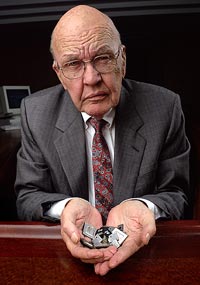
Jack St. Clair Kilby was an American electrical engineer who took part, along with Robert Noyce of Fairchild Semiconductor, in the realization of the first integrated circuit while working at Texas Instruments (TI) in 1958. He was awarded the Nobel Prize in Physics on 10 December 2000.

Robert Gray Gallager is an American electrical engineer known for his work on information theory and communications networks.
Ronald W. Schafer is an American electrical engineer notable for his contributions to digital signal processing.
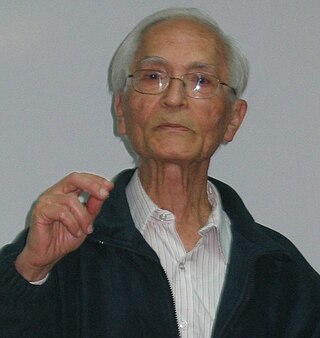
Jacob Ziv was an Israeli electrical engineer and information theorist who developed the LZ family of lossless data compression algorithms alongside Abraham Lempel.
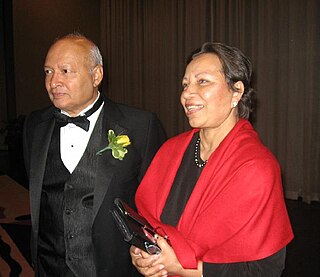
Thomas Kailath is an Indian born American electrical engineer, information theorist, control engineer, entrepreneur and the Hitachi America Professor of Engineering emeritus at Stanford University. Professor Kailath has authored several books, including the well-known book Linear Systems, which ranks as one of the most referenced books in the field of linear systems.
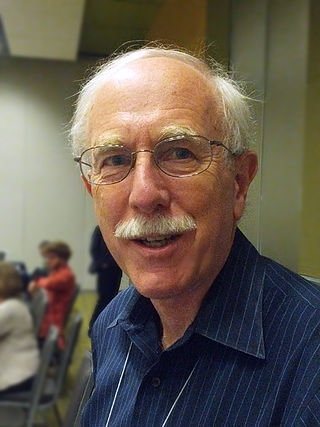
James H. McClellan is the Byers Professor of Signal Processing at the Georgia Institute of Technology. He is widely known for his creation of the McClellan transform and for his co-authorship of the Parks–McClellan filter design algorithm.

Thomas Shi-Tao Huang was a Chinese-born American computer scientist, electrical engineer, and writer. He was a researcher and professor emeritus at the University of Illinois at Urbana-Champaign (UIUC). Huang was one of the leading figures in computer vision, pattern recognition and human computer interaction.
Alan Victor Oppenheim is a professor of engineering at MIT's Department of Electrical Engineering and Computer Science. He is also a principal investigator in MIT's Research Laboratory of Electronics (RLE), at the Digital Signal Processing Group.
Arun N. Netravali is an Indian–American computer engineer credited with contributions in digital technology including HDTV. He conducted research in digital compression, signal processing and other fields. Netravali was the ninth President of Bell Laboratories and has served as Lucent's Chief Technology Officer and Chief Network Architect. He received his undergraduate degree from IIT Bombay, India, and an M.S. and a Ph.D. from Rice University in Houston, Texas, all in electrical engineering. Several global universities, including the Ecole Polytechnique Federale in Lausanne, Switzerland, have honored him with honorary doctorates.
Toby Berger was an American information theorist.
Fumitada Itakura is a Japanese scientist. He did pioneering work in statistical signal processing, and its application to speech analysis, synthesis and coding, including the development of the linear predictive coding (LPC) and line spectral pairs (LSP) methods.
The IEEE Jack S. Kilby Signal Processing Medal is presented "for outstanding achievements in signal processing" theory, technology or commerce. The recipients of this award will receive a gold medal, together with a replica in bronze, a certificate and an honorarium.
Charles Sidney Burrus was an American electrical engineer and the Maxfield and Oshman Professor Emeritus of Electrical and Computer Engineering at Rice University in Houston, Texas. He is widely known for his contributions to digital signal processing, especially FFT algorithms, IIR filter design, and wavelets.
Thomas W. Parks was an American electrical engineer and Professor Emeritus of Electrical and Computer Engineering at Cornell University. He is best known for his contributions to digital signal processing, especially digital filter design and computation of the fast Fourier transform. His last work before retirement was in the area of demosaicing.
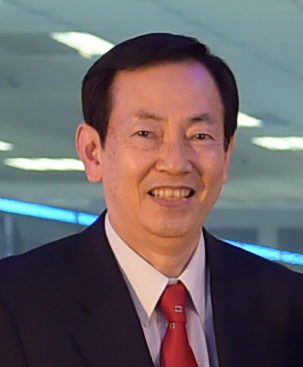
Yasuo Matsuyama is a Japanese researcher in machine learning and human-aware information processing.
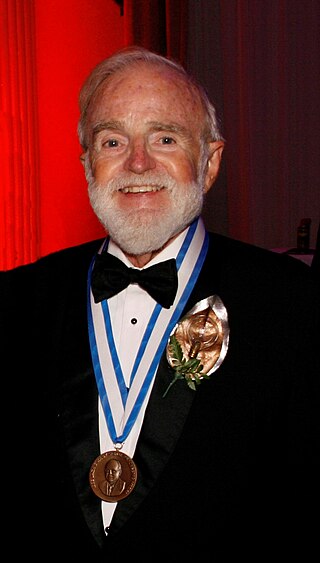
Harry Leslie Van Trees was an American scientist specializing in radar, sonar, communications and signal processing.
Palghat P. Vaidyanathan is the Kiyo and Eiko Tomiyasu Professor of Electrical Engineering at the California Institute of Technology, Pasadena, California, USA, where he teaches and leads research in the area of signal processing, especially digital signal processing (DSP), and its applications. He has authored four books, and authored or coauthored close to six hundred papers in various IEEE journals and conferences. Prof. Vaidyanathan received his B.Tech. and M.Tech. degrees from the Institute of Radiophysics and Electronics, Science College campus of University of Kolkata, and a Ph.D. degree in Electrical Engineering from University of California Santa Barbara in 1982.

John Makhoul is a Lebanese-American computer scientist who works in the field of speech and language processing. Dr. Makhoul's work on linear predictive coding was used in the establishment of the Network Voice Protocol, which enabled the transmission of speech signals over the ARPANET. Makhoul is recognized in the field for his vital role in the areas of speech and language processing, including speech analysis, speech coding, speech recognition and speech understanding. He has made a number of significant contributions to the mathematical modeling of speech signals, including his work on linear prediction, and vector quantization. His patented work on the direct application of speech recognition techniques for accurate, language-independent optical character recognition (OCR) has had a dramatic impact on the ability to create OCR systems in multiple languages relatively quickly.
Allen Gersho is a professor emeritus at UCSB who made significant contributions in the area of signal compression and speech coding.









